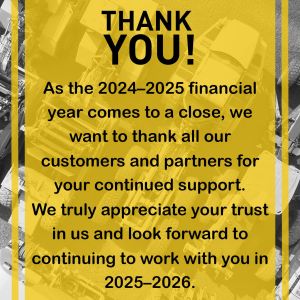Through various circumstances, I’ve been in the fortunate position to have to take a deep dive into sections of our business that normally “tick along”. It’s been a very interesting journey, and something I wholeheartedly encourage all business owners and managers to do from time to time. Here’s why.
When things are progressing well and great results are there, complacency can set in. If it ain’t broke, don’t fix it. But what if there are tuning opportunities to make the results and service levels even better?
Some of the initiatives came about by chance, others through having to fill in for functions normally done by someone else (a fresh set of eyes and seeing the whole picture). Others by outside changes (new technology or suppliers). Whatever the trigger, there are potential positive changes both small and large in every business.
The best way to give an example covering many of these aspects is something that started off by chance. Our long term foreign exchange provider (the massive AMEX) decided that it was no longer viable for them to offer forex services. They issued a polite notice giving all customers just under 3 months notice. Luckily, we commenced setting up an alternative provider immediately, because thanks to legislation around financial services, it took that long to jump through the hoops, and we were “ready” with just a few days to spare.
This triggered a review of our banking arrangements. Let’s just say that it is now obvious why so many customers (households and businesses) stay with their existing institutions. Banking (and power supply) should be two of the simplest services to understand and access. Forms, many of them near identical, required signatures and approvals back and forth, corrections etc. Just like with many Government services, all I can say is that the people who design the requirements or systems have never done it themselves. They should “deep dive” and try their own systems, not hypothetically, but actually having to physically collate the documents etc for real. Digressing slightly, it’s interesting how often one has to fill in a form where something as simple as the field for a mobile or email is too small to fit the requested information. They could even just ask their staff for feedback, because the forms often don’t match the internal processes – examples like this identify not only customer frustrations but also costly time wasting activities within the company itself.
The end result is that we have now partially changed all our banking arrangements. Still beats me why we have to have a transactional account, and a separate high interest rate account (with limited transactions per month). Surely it would be cheaper and easier for banks to rationalise their account offerings so they could manage about half the number of accounts compared to what they have. For a personal account, we still get mailed monthly statements with a zero balance for accounts with a bank that we stopped using over 10 years ago, and for the business we get daily mailed statements despite being able to access the information on demand on line – the banks should identify this kind of waste and contact the account holders because god now knows it’s much too hard to try to contact the bank to get them to do it for you. Might send Australia Post broke though.
In the end, it was worth going through the exercise. We now earn more than twice the interest on our deposits. Not quite money for nothing, but pretty close. With growing risks around cybercrime, these changes have allowed us to tighten some potential security issues. We also managed to better use technology to be able to semi-automate some of our banking and accounting functions, thereby reducing the potential for errors as well as freeing up our people to do more valuable tasks. As businesses get a grasp on AI, business should expect to stay abreast of developments or get left behind.
We are proud of having long associations with many of our suppliers and service providers. It was a bit disappointing that in some cases this loyalty wasn’t reciprocated, and when for instance our linen supplier and waste disposal providers service levels became unacceptable (we thought it had to do with Covid staffing issues and the like), we looked for alternative suppliers only to find that the pricing creep had let’s just say gone so far that we felt taken advantage of. Exit stage left, the new smaller providers appreciate our business.
Other common areas that need nearly annual review is the cost of insurance and power supply. Getting a comparative quote or even just calling your provider at renewal time tends to save about 10% each year compared to just rolling over. I can never understand why many companies offer incentives to bring new customers on board that exceed those they give to simply keep their existing loyal customers. Surely the cost and effort of constantly attracting new customers would be prohibitive also.
It might mean having to get down and dirty with tasks you don’t normally do, but doing something different is rewarding, inspiring and challenging. It’s important to listen to suggestions from customers as well as people within your business, but equally important to be mindful that generally people are often afraid of change so might not suggest it. Sometimes they might think it affects their job security or have a vested interest in keeping the status quo. In some cases it left me with the feeling of “why didn’t we do this earlier”. The best time to make improvements is yesterday. The second best time is now.
Words from the wise
“Don’t be afraid to give up the good to go for the great.” – John D Rockefeller.
“There is nothing so useless as doing efficiently that which should not be done at all” – Peter Drucker.
“If the ladder is not leaning against the right wall, every step we take just gets us to the wrong place faster.” – Stephen Covey.
As always, Onwards and Upwards!
Fred Carlsson
General Manager



